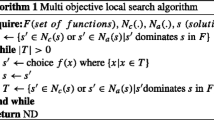Abstract
Classifier ensemble techniques are effectively used to combine the responses provided by a set of classifiers. Classifier ensembles improve the performance of single classifier systems, even if a large number of classifiers is often required. This implies large memory requirements and slow speeds of classification, making their use critical in some applications. This problem can be reduced by selecting a fraction of the classifiers from the original ensemble. In this work, it is presented an ensemble-based framework that copes with large datasets, however selecting a small number of classifiers composing the ensemble. The framework is based on two modules: an ensemble-based Genetic Programming (GP) system, which produces a high performing ensemble of decision tree classifiers, and a Bayesian Network (BN) approach to perform classifier selection. The proposed system exploits the advantages provided by both techniques and allows to strongly reduce the number of classifiers in the ensemble. Experimental results compare the system with well-known techniques both in the field of GP and BN and show the effectiveness of the devised approach. In addition, a comparison with a pareto optimal strategy of pruning has been performed.
Access this chapter
Tax calculation will be finalised at checkout
Purchases are for personal use only
Preview
Unable to display preview. Download preview PDF.
Similar content being viewed by others
References
Banfield, R., Hall, L., Bowyer, K., Kegelmeyer, W.: Ensembles diversity measures and their application to thinning. Information Fusion 6, 49–62 (2005)
Cantú-Paz, E., Kamath, C.: Inducing oblique decision trees with evolutionary algorithms. IEEE Trans. on Evolutionary Computation 7(1), 54–68 (2003)
Cooper, G.F., Herskovits, E.: A bayesian method for the induction of probabilistic networks from data. Machine Learning 9(4), 309–347 (1992)
De Stefano, C., D’Elia, C., Scotto di Freca, A., Marcelli, A.: Classifier combination by bayesian networks for handwriting recognition. Int. Journal of Pattern Rec. and Artif. Intell. 23(5), 887–905 (2009)
De Stefano, C., Fontanella, F., Marrocco, C., Scotto di Freca, A.: A Hybrid Evolutionary Algorithm for Bayesian Networks Learning: An Application to Classifier Combination. In: Di Chio, C., Cagnoni, S., Cotta, C., Ebner, M., Ekárt, A., Esparcia-Alcazar, A.I., Goh, C.-K., Merelo, J.J., Neri, F., Preuß, M., Togelius, J., Yannakakis, G.N. (eds.) EvoApplicatons 2010, Part I. LNCS, vol. 6024, pp. 221–230. Springer, Heidelberg (2010)
Folino, G., Pizzuti, C., Spezzano, G.: Gp ensembles for large-scale data classification. IEEE Trans. on Evolutionary Computation 10(5), 604–616 (2006)
Folino, G., Pizzuti, C., Spezzano, G.: Training distributed gp ensemble with a selective algorithm based on clustering and pruning for pattern classification. IEEE Trans. Evolutionary Computation 12(4), 458–468 (2008)
Freund, Y., Shapire, R.: Proceedings of the 13th Int. Conference on Machine Learning
Gagné, C., Sebag, M., Schoenauer, M., Tomassini, M.: Ensemble learning for free with evolutionary algorithms? In: GECCO, pp. 1782–1789 (2007)
Kuncheva, L.I.: Combining Pattern Classifiers: Methods and Algorithms. Wiley-Interscience (2004)
Pearl, J.: Probabilistic Reasoning in Intelligent Systems: Networks of Plausible Inference. Morgan Kaufmann (1988)
Zhou, Z.H., Tang, W.: Selective Ensemble of Decision Trees. In: Wang, G., Liu, Q., Yao, Y., Skowron, A. (eds.) RSFDGrC 2003. LNCS (LNAI), vol. 2639, pp. 476–483. Springer, Heidelberg (2003)
Author information
Authors and Affiliations
Editor information
Editors and Affiliations
Rights and permissions
Copyright information
© 2012 Springer-Verlag Berlin Heidelberg
About this paper
Cite this paper
De Stefano, C., Folino, G., Fontanella, F., Scotto di Freca, A. (2012). Pruning GP-Based Classifier Ensembles by Bayesian Networks. In: Coello, C.A.C., Cutello, V., Deb, K., Forrest, S., Nicosia, G., Pavone, M. (eds) Parallel Problem Solving from Nature - PPSN XII. PPSN 2012. Lecture Notes in Computer Science, vol 7491. Springer, Berlin, Heidelberg. https://doi.org/10.1007/978-3-642-32937-1_24
Download citation
DOI: https://doi.org/10.1007/978-3-642-32937-1_24
Publisher Name: Springer, Berlin, Heidelberg
Print ISBN: 978-3-642-32936-4
Online ISBN: 978-3-642-32937-1
eBook Packages: Computer ScienceComputer Science (R0)




